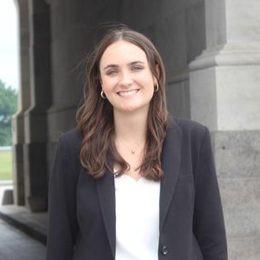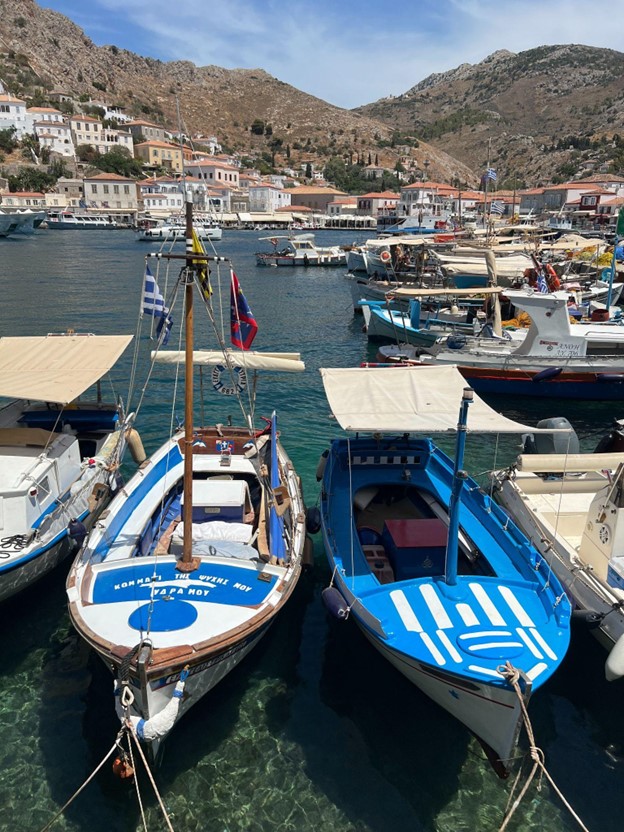By Grace Anderson
Crisp blue skies, white sand beaches, and vibrant oceans. Stone steps line the walkway up to towering limestone pillars as cool, howling wind echoes between them. A curious student embarks on his journey up the mighty steps to the Temple of Apollo. He takes one step at a time, gazing reverently across wide vistas and feeling pebbles crumble beneath his feet. He can imagine what this temple looked like in 5 B.C, filled with activity, colorful clothing, and verbal offerings to the god. But now, he stands with his University of Florida classmates on the remnants of those ancient grounds—a physical reminder of the richness of Greek culture.
This temple, dedicated to Apollo, the god of healing, is an important landmark in Greece. When some hear the name “Apollo,” they think only of the important figure in Greek mythology. Dr. Jessica-Jean Stonecipher, however, thinks of her own son, Apollo. Her decision to name him after the Greek figure is a tangible credit to the influence medicine has had on her life.
Drawing from her past work as a medical anthropologist, Stonecipher wanted to create a UF study abroad program for students interested in health and medicine. After studying in Nicaragua in graduate school, she learned the value of immersing oneself into a different culture and environment.
“Living in a place that isn’t your home changes you,” she notes. Pulling from that experience, Stonecipher joined with Dr. Alison Reynolds to create a six-week study abroad program offered through the UF Writing Program (UWP). By Summer A, 2024, they were taking their fourth group of students to Thessaloniki, Greece.
Located on the Mediterranean Sea, Thessaloniki is Greece’s second largest city. Full of ancient Roman, Byzantine, and Ottoman history, it is also close to one of the first hospitals in Europe. According to Stonecipher, studying in Greece offers a unique opportunity for students because of its lack of a language barrier and its drastic difference to the American healthcare system. In Greece, a majority of people are bilingual, and they have access to universal health coverage. Bilingual cultures are beneficial to students because they can engage with locals without being hindered by a linguistic barrier. Studying medicine through culture gives students a deeper understanding of health and wellness and complements UF classes teaching the scientific building blocks of medicine in subjects like biology and chemistry.
To do this, the UF in Greece study abroad program offers two 3-credit courses taught by Stonecipher, Reynolds, and a practicing physician and professor at Aristotle University. The courses are entitled IDS4946, Global Challenges and Design Thinking in Health, and ENC4930, Grecian Medical Narratives in Global Health Systems. Students attend lectures that introduce the Greek healthcare system and also hear guest lectures from experts in public health. As students shadow healthcare professionals at area nonprofits, they choose their preferred individual area of focus. In past trips, holistic dentistry and maternal health are just two of the many options students explored as part of their studies.
Throughout the trip, students encounter a different cultural attitude toward healthcare in the classroom and firsthand. Stonecipher notes that Greek culture’s continuous commitment to holistic health puts an emphasis on creating multifaceted healing spaces. In addition to medication and treatment for physical ailments, Greek culture incorporates and prioritizes a balanced diet, exercise, and places for resting. This means that even as UF students are enjoying dolmades at Aristotle Square or relaxing on beaches near Thessaloniki, they continually ponder comparisons between the Greek healthcare system and systems they already know.
By witnessing the ways in which Greek healthcare differs from that practiced in the United States, students start to understand how a nation’s system, shaped by cultural and societal norms, influences who physicians can heal and the ways they can heal them. Stonecipher says that, when the group goes to Greece, they realize, “[healthcare] is so much more than just individual patient care.” When students return to the U. S., then, they bring more than just an appreciation for Greek history and culture—they bring back an entirely new perspective.
Some good advice for health and pre-med students? Take the UF in Greece study abroad trip with Dr. Stonecipher. Because if there is one person you want guiding you around Greece, it’s the professor who named her son after a figure in Greek mythology!
To learn more about this study abroad program offered by the University Writing Program, please visit this website: https://writing.ufl.edu.
 About Grace Anderson: Grace Anderson is an undergraduate majoring in public relations and minoring in leadership. She has played guitar since she was in middle school, and she enjoys playing in the worship band at Gator Wesley and in her hometown. Outside of music, she loves reading and trying new coffee shops. She has interned on Capitol Hill in D.C. and will intern in Prague in the summer of 2025. She plans to graduate in 2026 and will take a gap year to travel before going to law school.
About Grace Anderson: Grace Anderson is an undergraduate majoring in public relations and minoring in leadership. She has played guitar since she was in middle school, and she enjoys playing in the worship band at Gator Wesley and in her hometown. Outside of music, she loves reading and trying new coffee shops. She has interned on Capitol Hill in D.C. and will intern in Prague in the summer of 2025. She plans to graduate in 2026 and will take a gap year to travel before going to law school.
